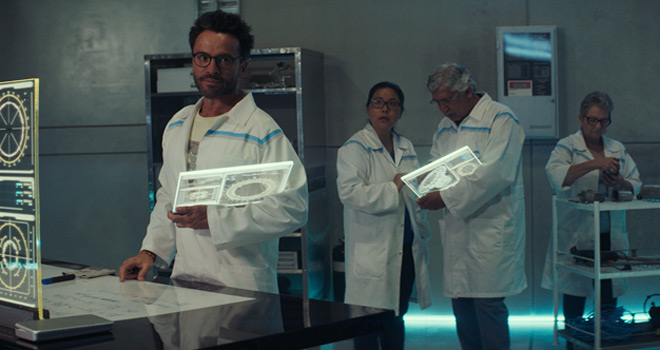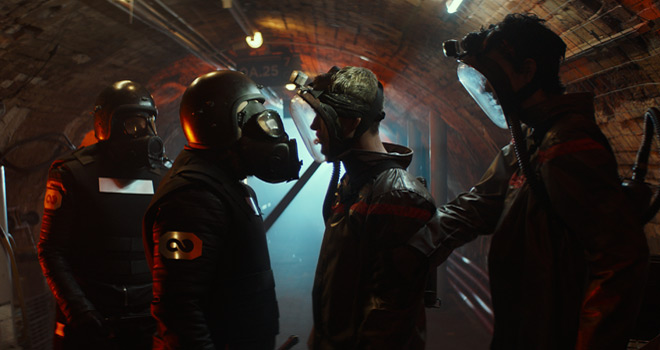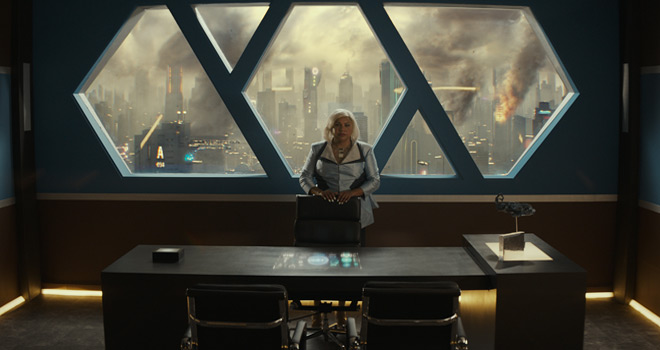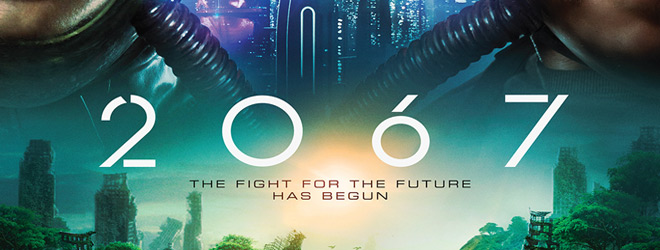Kodi Smit-McPhee and Ryan Kwanten star in the epic Sci-Fi odyssey 2067, which arrived in select theaters, as well as to On Demand and Digital, on Friday, October 2, 2020 via RLJE Films.
Written and directed by Seth Larney (Hipsters documentary series, Tombiruo 2017), 2067 explores a future in which environmental neglect has led to extreme climate change that has brought on floods, fires, and deforestation. With the loss of the very last tree in the Amazon rainforest, oxygen levels plummet and life as we know it is irreparably altered. Survivors are crowded into one city where artificial oxygen is their sole means of survival. And yet an illness is further ravaging the population, a rejection of the synthetic O2 that is guaranteed to kill off humanity if a cure cannot be found.

The only hope appears to be a message from the future, three simple words: “Send Ethan Whyte.” But Ethan (Smit-McPhee: The Road 2009, Let Me In 2020) is a mere underground tunnel worker, and even he doesn’t believe that he is the savior of humankind. Though with his wife Xanthe (Sana’a Shaik: Real Friends 2014, Reckoning mini-series) among the sick, love and devotion compel him to travel over 400 years into the future in hopes of bringing back a cure. Buoyed by the support of his co-worker and best friend Jude (Kwanten: Dead Silence 2007, True Blood series), Ethan will be forced to visit the forests of 2474 in a desperate attempt to save what’s left of the human species.
The film also features the acting talents of Aaron Glenane (68 Whiskey series, Snowpiercer series), Deborah Mailman (The Sapphires 2012, Offspring series), Leeanna Walsman (Looking for Alibrandi 2000, Star Wars: Episode II – Attack of the Clones 2002), Finn Little (Tidelands series, Storm Boy 2019), Damian Walshe-Howling (The Reef 2010, Bite Club series), and many more.
At 114 minutes, 2067 is a lovely slice of Australian born Science Fiction that explores weighty environmental themes and is, in some respects, similar to James Cameron’s 2009 spectacle Avatar. Set in a dystopian future where plant life no longer exists and oxygen must be artificially manufactured, it’s not hard to understand that there’s an imperative message baked into the layers of the film. A speculative look at a very real possibility for our future if we continue on our careless trajectory, the story at the heart of the film is so much more than a young man desperate to save his wife

And while it’s certainly not easy to make grandiose Sci-Fi without a blockbuster budget, 2067 does an amazing job of listing on its strengths. Some of the visuals are repeated, but this re-usage is kept to a bare minimum. And, yes, the scientific creation at the center of this time travel film, The Chronicle, is highly reminiscent of a jet engine that is conceptually similar to 1994’s Stargate and its ensuing series. Despite this, however, Larney is careful to use his magical CGI moments sparingly, instead crafting a character study with timely commentary that focuses on its message rather than an overpowering aesthetic.
So Larney does not skimp on his screenplay. Enlisting a wonderful ensemble cast, but keeping it rather small in comparison to many Sci-Fi offerings, he chooses to focus on the development of Smit-McPhee’s Ethan. As with many filmic heroes, Ethan has a traumatic event in his past that has shaped him, but not without scars. In the role, Smit-McPhee is never the obvious, brawny action-hero who stomps across the landscape with a singular aim in mind; rather, the talented actor delivers a nuanced performance that accentuates the emotional vulnerability of his character who will do anything for love—of family, friends, and Earth. It’s an interesting twist that places brains and heart far beyond physical power.
As his foil, Kwanten encompasses more of the villainous characteristics, leading him to portray an individual whose focus leans more toward his own survival rather than that of the entire species. He is the individual who refuses to take a potential life-saving action simply because it’s a small inconvenience to himself. Thus, if humanity is delivered into safety as part of the outcome that best suits Jude, well, that’s merely a bonus. More soldier-for-hire than heartfelt humanitarian, Kwanten’s Jude and Mailman’s Jackson are each the antithesis of Ethan’s kind-hearted, all-encompassing aims.

In this, 2067 has plenty to offer in its onscreen action and good acting, but why stop at this? An often beautifully melancholic, always magical score from The Macedonian Symphony Orchestra, conducted by Oleg Kondratenko, only elevates the experience as Smit-McPhee and Kwanten explore the forested future. Of course, CGI work is necessary to create the apocalyptic landscapes and this art is amazingly well-done, particularly in the scenes where the city has been reclaimed by nature. And to contrast all the intricate plot and character development, costume designer Oriana Merullo (Where the Wild Things Are 2009, Never Too Late 2020) takes a minimalist approach to her design, allowing the characters, rather than their wardrobes, to speak the loudest.
A perfect example of using your strengths to deliver an intriguing film with lofty goals, 2067 blasts into the future in an attempt to resolve the climate change issues of the (futuristic) present. With discussions of everything from faith to putting self-interest over global needs, the film holds up a mirror to reflect our modern, self-inflicted troubles; as one of the characters so poetically notes, “Humans are a virus and we’re suffocating the Earth.” But there is the ability to control our fate if we act soon enough, and 2067 is a bold reminder of this. An environmental and ecological plea in the form of a speculative Sci-Fi offering, Cryptic Rock gives 2067 4 of 5 stars.





